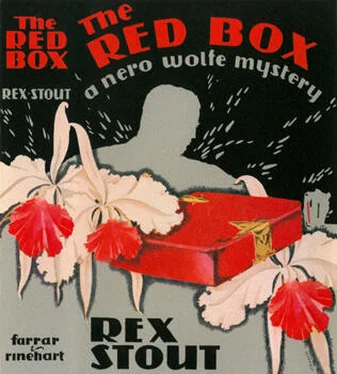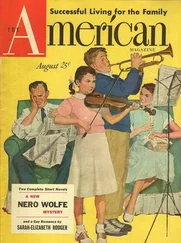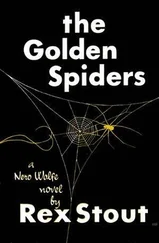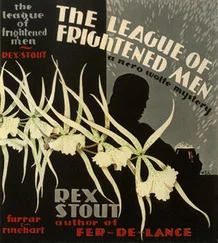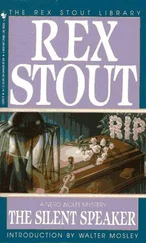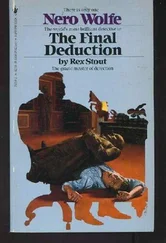Rex Stout - The Red Box
Здесь есть возможность читать онлайн «Rex Stout - The Red Box» весь текст электронной книги совершенно бесплатно (целиком полную версию без сокращений). В некоторых случаях можно слушать аудио, скачать через торрент в формате fb2 и присутствует краткое содержание. Год выпуска: 1937, Издательство: Farrar & Rinehart, Жанр: Детектив, на английском языке. Описание произведения, (предисловие) а так же отзывы посетителей доступны на портале библиотеки ЛибКат.
- Название:The Red Box
- Автор:
- Издательство:Farrar & Rinehart
- Жанр:
- Год:1937
- ISBN:нет данных
- Рейтинг книги:5 / 5. Голосов: 2
-
Избранное:Добавить в избранное
- Отзывы:
-
Ваша оценка:
- 100
- 1
- 2
- 3
- 4
- 5
The Red Box: краткое содержание, описание и аннотация
Предлагаем к чтению аннотацию, описание, краткое содержание или предисловие (зависит от того, что написал сам автор книги «The Red Box»). Если вы не нашли необходимую информацию о книге — напишите в комментариях, мы постараемся отыскать её.
This novel presents the series’ first instance of a murder taking place in Wolfe’s office.
The Red Box — читать онлайн бесплатно полную книгу (весь текст) целиком
Ниже представлен текст книги, разбитый по страницам. Система сохранения места последней прочитанной страницы, позволяет с удобством читать онлайн бесплатно книгу «The Red Box», без необходимости каждый раз заново искать на чём Вы остановились. Поставьте закладку, и сможете в любой момент перейти на страницу, на которой закончили чтение.
Интервал:
Закладка:
“I won’t do it again,” she promised. “No one really encouraged him. I’ve known him all my life, and mother knew him before I was born. Mother and father knew him. He has always been... attentive, and amusing, and in some ways he is interesting and I like him. In other ways I dislike him extremely. Mother has told me I should control my dislike on account of his good points, and she said that since he was such an old friend I shouldn’t wound his feelings by cutting him off, that it wouldn’t hurt to let him think he was still in the field as long as I hadn’t decided.”
“You agreed to that?”
“Well, I... I didn’t fight it. My mother is very persuasive.”
“What was the attitude of your uncle? Mr. Dudley Frost. The trustee of your property.”
“Oh, I never discussed things like that with him. But I know what it would have been. He didn’t like Perren.”
“And Mr. McNair?”
“He disliked Perren more than I did. Outwardly they were friends, but... anyway, Uncle Boyd wasn’t two-faced. Shall I tell you...”
“By all means.”
“Well, one day about a year ago Uncle Boyd sent for me to go upstairs to his office, and when I went in Perren was there. Uncle Boyd was standing up and looking white and determined. I asked him what was the matter, and he said he only wanted to tell me, in Perrens’s presence, that any influence his friendship and affection might have on me was unalterably opposed to my marriage with Perren. He said it very... formally, and that wasn’t like him. He didn’t ask me to promise or anything. He just said that and then told me to go.”
“And in spite of that, Mr. Gebert has persisted with his courtship.”
“Of course he has. Why wouldn’t he? Lots of men have. I’m so rich it’s worth quite an effort.”
“Dear me.” Wolfe’s eyes flickered open at her and half shut again. “As cynical as that about it? But a brave cynicism which is of course proper. Nothing is more admirable than the fortitude with which millionaires tolerate the disadvantages of their wealth. What is Mr. Gebert’s profession?”
“He hasn’t any. That’s one of the things I don’t like about him. He doesn’t do anything.”
“Has he an income?”
“I don’t know. Really, I don’t know a thing about it. I suppose he has... I’ve heard him make vague remarks. He lives at the Chesebrough, and he drives a car.”
“I know. Mr. Goodwin informed me he drove it here yesterday. At all events, a man of courage. You knew him in Europe; what did he do there?”
“No more than here, as far as I remember — of course I was young then. He was wounded in the war, and afterwards came to visit us in Spain — that is, my mother, I was only two years old — and he went to Egypt with us a little later, but when we went on to the Orient he went back—”
“One moment, please.” Wolfe was frowning. “Let us tidy up the chronology. There seems to have been quite a party in Spain; almost Mr. McNair’s last words were that he had gone to Spain with his baby daughter. We’ll start when your life started. You were born, you told me yesterday, in Paris — on May 7th, 1915. Your father was already in the war, as a member of the British Aviation Corps, and he was killed when you were a few months old. When did your mother take you to Spain?”
“Early in 1916. She was afraid to stay in Paris, on account of the war. We went first to Barcelona and then to Cartagena. A little later Uncle Boyd and Glenna came down and joined us there. He had no money and his health was bad, and mother... helped him. I think Perren came, not long after, partly because Uncle Boyd was there — they had both been friends of my father’s. Then in 1917 Glenna died, and soon after that Uncle Boyd went back to Scotland, and mother took me to Egypt because they were afraid of a revolution or something in Spain, and Perren went with us.”
“Good. I own a house in Egypt which I haven’t seen for twenty years. It has Rhages and Veramine tiles on the doorway. How long were you in Egypt?”
“About two years. In 1919, when I was four years old — of course mother has told me all this — three English people were killed in a riot in Cairo, and mother decided to leave. Perren went back to France. Mother and I went to Bombay, and later to Bali and Japan and Hawaii. My uncle, who was the trustee of my property, kept insisting that I should have an American education, and finally, in 1924 — I was nine years old then — we left Hawaii and came to New York. It was from that time on, really, that I knew Uncle Boyd, because of course I didn’t remember him from Spain, since I had been only two years old.”
“He had his business in New York when you got here?”
“No. He has told me — he started designing for Wilmerding in London and was very successful and became a partner, and then he decided New York was better and came over here in 1925 and went in for himself. Of course he looked mother up first thing, and she was a little help to him on account of the people she knew, but he would have gone to the top anyway because he had great ability. He was very talented. Paris and London were beginning to copy him. You would never have thought, just being with him, talking with him... you would never have thought...”
She faltered, and stopped. Wolfe began to murmur something at her to steady her, but an interruption saved him the trouble. Fritz appeared to announce lunch. Wolfe pushed back his chair:
“Your coat will be all right here, Miss Frost. Your hat? But permit me to insist, as a favor; to eat with a hat on, except in a railroad station, is barbarous. Thank you. Restaurant? I know nothing of restaurants; short of compulsion, I would not eat in one were Vatel himself the chef.”
Then, after we were seated at the table, when Fritz came to pass the relish platter, Wolfe performed the introduction according to his custom with guests who had not tasted that cooking before:
“Miss Frost, Mr. Frost, this is Mr. Brenner.”
Also according to custom, there was no shop talk during the meal. Llewellyn was fidgety, but he ate; and the fact appeared to be that our new client was hungry as the devil. Probably she had had no breakfast. Anyway, she gave the fricandeau a play which made Wolfe regard her with open approval. He carried the burden of the conversation, chiefly about Egypt, tiles, the uses of a camel’s double lip, and the theory that England’s colonizing genius was due to her repulsive climate, on account of which Britons with any sense and willpower invariably decided to go somewhere else to work. It was two-thirty when the salad was finished, so we went back to the office and had Fritz serve coffee there.
Helen Frost telephoned her mother. Apparently there was considerable parental protest from the other end of the wire, for Helen sounded first persuasive, then irritated, and finally fairly sassy. During that performance Llewellyn sat and scowled at her, and I couldn’t tell whether the scowl was for her or the opposition. It had no effect on our client either way, for she was sitting at my desk and didn’t see it.
Wolfe started in on her again, resuming the Perren Gebert tune, but for the first half hour or so it was spotty because the telephone kept interrupting. Johnny Keems called to say that he could leave the Pritchard job if we needed him, and I told him that we’d manage to struggle along somehow. Dudley Frost phoned to give his son hell, and Llewellyn took it calmly and announced that his cousin Helen needed him where he was, whereupon she kept a straight face but I smothered a snicker. Next came a ring from Fred Durkin, to say that they had arrived and taken possession of Glennanne, finding no one there, and had begun operations; the phone at the cottage was out of order, so Saul had sent Fred to the village to make that report. A man named Collinger phoned and insisted on speaking to Wolfe, and I listened in and took it down as usual; he was Boyden McNair’s lawyer, and wanted to know if Wolfe could call at his office right away for a conference regarding the will, and of course the bare idea set Wolfe’s digestion back at least ten minutes. It was arranged that Collinger would come to 35th Street the following morning. Then, a little after three o’clock, Inspector Cramer got us, and reported that his army was making uniform progress on all fronts: namely, none. No red box and no information about it; no hide or hair of motive anywhere; nothing among McNair’s papers that could be stretched to imply murder; no line on a buyer of potassium cyanide; no anything.
Читать дальшеИнтервал:
Закладка:
Похожие книги на «The Red Box»
Представляем Вашему вниманию похожие книги на «The Red Box» списком для выбора. Мы отобрали схожую по названию и смыслу литературу в надежде предоставить читателям больше вариантов отыскать новые, интересные, ещё непрочитанные произведения.
Обсуждение, отзывы о книге «The Red Box» и просто собственные мнения читателей. Оставьте ваши комментарии, напишите, что Вы думаете о произведении, его смысле или главных героях. Укажите что конкретно понравилось, а что нет, и почему Вы так считаете.
